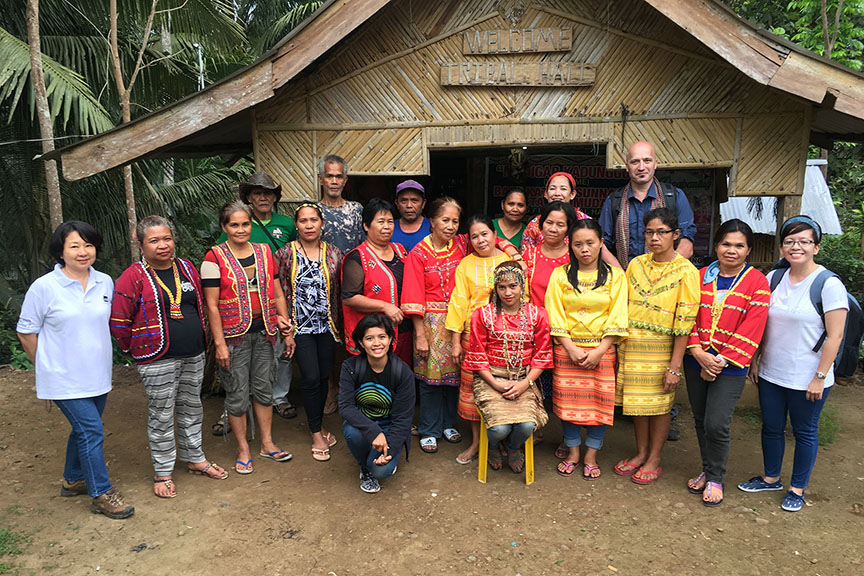 Bagobo Tagabawa farmers in Barangay Binaton in Digos City, Davao del Sur. Photo courtesy of Felicitas “Joji” B. Pantoja
Bagobo Tagabawa farmers in Barangay Binaton in Digos City, Davao del Sur. Photo courtesy of Felicitas “Joji” B. Pantoja
DAVAO CITY (MindaNews / 16 February) – An official of the National Commission on Indigenous People (NCIP)-Davao Region warned buyers of lands inside ancestral domains that they could not claim ownership of these areas as well as the structures built on them, as the law prohibits the sale of these lands.
NCIP-Davao regional director lawyer Geroncio R. Aguio, interviewed at the sidelines of Wednesday’s Habi at Kape, was reacting to reports that selling of lands within ancestral domains has become more rampant.
Aguio said the structures built on these lands would be turned over to the indigenous peoples community.
He said non-members of the IP community enjoy certain rights as lessors under a contract of lease, which is valid for a period of 25 years.
But he added that if the lease is not renewed, lessors have the option to remove the movable properties but ownership of the immovable properties will go in favor of the Lumad upon expiry of the contract.
“Who owns the lands owns the structures. That’s why they need to pay rent to occupy. Later on, if the contract expires, it will revert to the IP community – including the structures – because the land is owned by the IP community,” he said.
He said a number of business structures — including resorts and restaurants — have been built in areas in Barangay Kapatagan in Digos City, Davao del Sur, which is within the ancestral domain of the Bagobo-Tagabawa.
Rogelio Manapol Jr., tribal chieftain of the Unified Bagobo Tagabawa, said the ancestral lands belonging to them include those within Digos City, Bansalan, Santa Cruz, portions of Sibulan, and Old Bulatukan in North Cotabato.
In May 2023, Manapol Jr. sued individuals, including barangay officials who allegedly facilitated the sale of ancestral lands, for violation of Sections 5, 10, and 72 of Republic Act 8371 or Indigenous Peoples Rights Act (Ipra) of 1997.
Manapol said it was his late father, Rogelio Manapol, a tribal chieftain, who reported the alleged illegal selling of ancestral lands to the National Bureau of Investigation-Davao on September 23, 2022, resulting in an entrapment operation on October 13, 2022 at the Barangay Hall in Kapatagan.
Aguio said RA 8371 prohibits the sale of ancestral lands to non-members of the IP community but allows rent or use, provided that the authorized indigenous political structure gives its consent.
He said there are still people who continue to purchase lands despite penalties under Ipra, which imposes an imprisonment of not less than nine months but not more than 12 years or a fine of not less than P100,000 to P500,000, or both, upon conviction.
“To all those who purchased lands, you cannot own that property because it is expressly prohibited… If you have spent your money, that will be at your own risk,” he said.
The official added that migrants occupying lots within ancestral lands prior to the passage of the law are issued with certificates of land occupation but their stay is subject to the regulations of the IP community.
He said over 50 percent of the land area in Davao Region are within ancestral domains.
He said the agency is promoting the implementation of a Community Resource Development and Management Plan to help the IPs in managing their wealth or resources.
“Wealth is a critical aspect of development. With the wealth management plan, the focus is that all profits from ancestral domains will be put in a trust account,” he said.
The NCIP will regulate the fund but the indigenous political structures will have control of it, according to Aguio.
He said there is a need to create a trust fund to support the community’s own development plans while a certain allocation would be saved for the next generation.“There should be for the next generation. In the ancestral domain, resources include minerals. Minerals are finite. If it gets depleted, nothing will be left for the next generation,” he said. (Antonio L. Colina IV/MindaNews)
